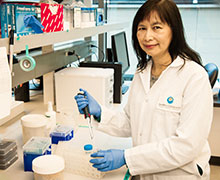Treatments for Hemophilia – Immunomodulation Therapy
Immunomodulation therapy to prevent or modulate inhibitory antibody responses in hemophilia patients
Technology Overview
Thirty percent of hemophilia A patients develop inhibitor antibodies against factor VIII following protein replacement therapy. Current tolerance induction protocol involves long-time administration of high doses of factor VIII, which is both inconvenient and costly. One-third of patients fail to induce tolerance using this protocol.

Dr. Carol Miao
Prophylactic tolerance induction protocols involving a short immunosuppressive regimen with minimum side effects and toxicity are highly promising strategies for patients at high risk. Dr. Carol Miao ’s lab has developed several potent immunotherapies to prevent inhibitory antibody production in hemophilia A mice, including agents to block costimulatory pathways such as CTLA4-Ig combined with anti-CD40L, and anti-ICOS, agents to deplete T cells such as anti-CD3, agents to induce Treg cell expansion such as anti-CD3, or agents to induce Treg cell expansion such as IL2-IL2mAb complexes, which can be administered in combination with repeated injections of low doses of FVIII to induce long-term tolerance of FVIII.
Another strategy is to adoptively transfer FVIII-specific regulatory T cells to suppress anti-FVIII responses. These new transient immunosuppression strategies for tolerance induction can not only reduce the costs, but also shorten the treatment time and increase the success rate. Clinical testing of some of these regimens is highly anticipated.
Stage of Development
- Pre-clinical in vivo
- Pre-clinical in vitro
Partnering Opportunities
- Collaborative research opportunity
- Sponsored research agreement
- Consultation agreement
Publications
- Hung KL, Meitlis I, Hale M, Chen CY, Singh S, Jackson SW, Miao CH, Khan IF, Rawlings DJ, James RG., Engineering Protein-Secreting Plasma Cells by Homology-Directed Repair in Primary Human B Cells. Mol Ther. 2018 Feb 7;26(2):456-467.
- Liu CL, Lyle MJ, Shin SC, Miao CH. The dataset from administration of single or combined immunomodulation agents to modulate anti-FVIII antibody responses in FVIII plasmid or protein primed hemophilia A mice. Data Brief. 2016 Mar 17; 7:973-80.
- Liu CL, Lyle MJ, Shin SC, Miao CH. Strategies to target long-lived plasma cells for treating hemophilia A inhibitors. Cell Immunol. 2016 Mar; 301:65-73.
- Liu C, Ye P, Lin J, Djukovic D, Miao CH. (2014) Long-term tolerance to factor VIII is achieved by administration of IL-2/IL-2mAb complexes and low dosages of factor VIII. J Thromb Haemost. 12 (6):921-31
- Miao CH. (2010) Immunomodulation for inhibitors in hemophilia A: the important role of Treg cells. Expert Rev Hematol. 3 (4): 469-83
- Miao CH, Harmeling BR, Ziegler SF, Yen BC, Torgerson T, Chen L, Yau RJ, Peng B, Thompson AR, Ochs HD, Rawlings DJ. (2009) CD4+FOXP3+ regulatory T cells confer long-term regulation of factor VIII-specific immune responses in plasmid-mediated gene therapy-treated hemophilia mice. Blood, 114 (19):4034-44.
Learn More
To learn more about partnering with Seattle Children’s Research Institute on this or other projects, email the Office of Science-Industry Partnerships.
